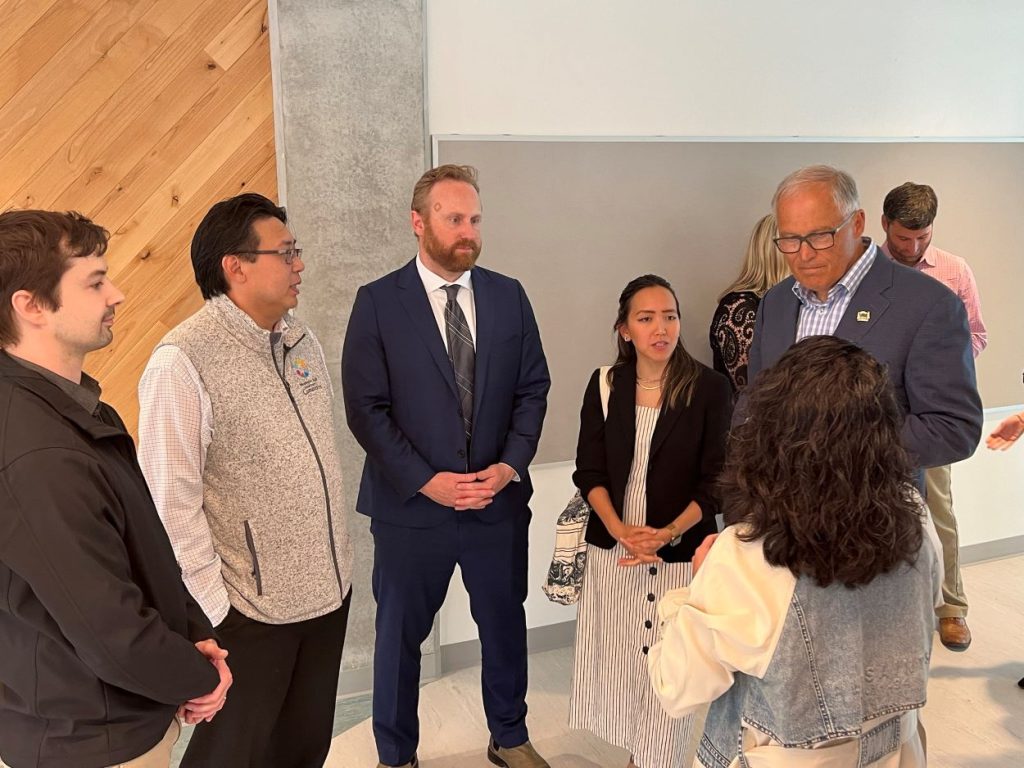OLYMPIA—State officials rolled out a program on Monday, July 29, providing a one-time $200 credit on electric bills for up to 675,000 low- and moderate-income households in Washington.

Funded with proceeds from the state’s auction of pollution credits, it’s the most visible investment yet from the Climate Commitment Act, a 2021 law that critics say is driving up energy costs for consumers and is targeted for repeal with an initiative on the November ballot.
“There’s one reason and one reason only we’ve been able to do this. It’s because we have the Climate Commitment Act,” Gov. Jay Inslee said Monday. “It’s a big deal for families in this income bracket.”
Washington will use $150 million of auction proceeds to fund the Washington Families Clean Energy Credits program.
The state Department of Commerce will distribute the money in the form of grants to electric utility companies, which will award credits to eligible customer accounts. Credits are limited to one per household and will be applied to electric bills no later than Sept. 15.
Those who are already enrolled in a utility company’s low-income assistance program will automatically get the credit. Anyone else who may fit the criteria should apply online.
Credits will go first to those living at or below 80% of the area’s median income. Those with incomes up to 150% of the area median income could receive one, if the money stretches that far. You can go to this state website to see if you might be eligible.
Homeowners and renters can apply as long as the electric utility account is in their name, or someone in their household. It is open to all households, regardless of citizenship.
The Climate Commitment Act passed in 2021, and it’s arguably the state’s most ambitious policy for curbing greenhouse gas emissions by putting a price on pollution.
Under the law, the state imposes annual limits on emissions for major emitters and requires them to buy allowances at auctions for each metric ton of pollution. Over time the state lowers the limit, or cap, for them. Washington has a goal of erasing fossil fuel emissions statewide by mid-century.
The current two-year state budget is the first in which the governor and lawmakers are spending auction proceeds.
Inslee first pitched the electricity bill credit in December. Lawmakers earmarked the money in the supplemental state budget to pay for it. At the time, Republicans, who opposed the law in 2021, cried foul, saying that the issuance of rebates ahead of November smacked of electioneering.
Because the program is intended to be done by mid-September, it won’t be affected by Initiative 2117, which would erase the law if passed on the fall ballot.
On Monday, Brian Heywood, founder of Let’s Go Washington, the political committee behind the initiative, said the utility rebates were being used to “bribe” people into keeping the Climate Commitment Act.
Hours before Inslee’s event, Heywood and other backers of Initiative 2117 gathered at a gas station in Richland to argue the cost of complying with the law is driving up the price of fuel. For two hours, the station’s price dropped to $3.50 a gallon, the national average, with Let’s Go Washington covering the markdown.
“Inslee has created a program where taxes take thousands out of voter’s paychecks, then a couple hundred dollars are offered back to them to try to make up for it,” Heywood said in a statement. “Government greed is at an all time high and we’ve had enough of the most regressive tax in state history.”
But supporters of the utility credits say rebates are an important step in alleviating the costs of a clean energy transition for many households.
Patience Malaba, executive director at the Housing Development Consortium, said Monday that there are many families across Washington that are burdened by high energy costs and they need support from the state in order to help fight climate change.
“The clock is ticking and we do not have much time,” she said. “The future of our children is hanging in the balance.”
Inslee on Monday also pointed to other ways that the state is helping low income families lower their energy costs, such as providing more low-cost insulation, heat pumps, solar panels and free transit rides – funded by the Climate Commitment Act.
“I think Washingtonians are against pollution, and I think they believe we should help some of our low-income folks,” he said.
SOURCE: This article was authored by Jerry Cornfield and Laurel Demkovich of the Washington State Standard part of States Newsroom, a nonprofit news network supported by grants and a coalition of donors as a 501c(3) public charity. Images and X posts were added by the Lynnwood Times.
Author: Lynnwood Times Contributor











One Response
Reading this just makes me sick. Washington has so many other issues that would help out residents of this state, other then sending a check to lower income residents.
Lower income families need the help but remember the state has already taxed the low income to support this Cap & Trade. So by giving some back is looking a lot like a bride. Just like the Poulty/Egg fixed pricing law suite. What did that fix. Higher egg prices, Ckicken price per pound from $1.49lb to over $4.50lb. Our AG hasn’t done a thing to help lower income residents.
I have see so many issues that seem to buy votes for the upcoming elections.
Lets us this money to fight these wild fires that are causing such bad air quaility people have to stay inside.
Just look at every fire that we have, we like to monitor the fire. Why not spend the money on cleaning the old access roads so these fires can be managed faster and safer.
Sorry, just had to rant a bit. Were to busy blaming everything / everyone else for our own failures.